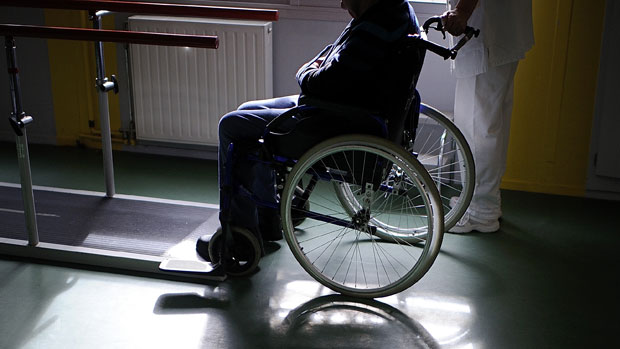Electric shocks help paralysed men move again
New electric stimulator helps four paralysed men move their legs for the first time in years

A free daily email with the biggest news stories of the day – and the best features from TheWeek.com
You are now subscribed
Your newsletter sign-up was successful
FOUR paralysed men have been able to move their legs for the first time in years with the aid of an electric stimulator.
The experimental treatment allows the men to independently flex their toes, ankles and knees. None of the men have been able to walk again, but researchers believe that the stimulator may help retrain the damaged nerves in their spinal column to communicate with their brains.
How does it work? Originally developed to treat chronic pain, the pacemaker-sized device is implanted beneath the skin on the abdomen. When turned on, it delivers low pulses of electricity through electrodes placed near the spinal cord. For patients who suffer from chronic pain, the device interrupted the pain signal before it reaches the brain. But researchers saw an opportunity to use the device to return movement to patients with paralysis.
The Week
Escape your echo chamber. Get the facts behind the news, plus analysis from multiple perspectives.

Sign up for The Week's Free Newsletters
From our morning news briefing to a weekly Good News Newsletter, get the best of The Week delivered directly to your inbox.
From our morning news briefing to a weekly Good News Newsletter, get the best of The Week delivered directly to your inbox.
Dr Roderic Pettigrew, director of the National Institute of Biomedical Imaging and Bioengineering, said that while the results of the initial stage of testing were not a "breakthrough", they showed great promise. "The next generation will be more precisely controlled and non-invasive," Pettigrew said.
What is the effect? The device allows the four men to control the movement of their lower bodies at a precise pace, moving their legs, feet and toes up and down voluntarily. All but one of the men were also able to control the force of their movement.
One of the researchers involved in the project, Dr Claudia Angeli, told the BBC: "They will tell you that the stimulation itself and being able to practise and move around makes them feel a lot better, some of them will just describe it as feeling alive again... Muscle mass increases significantly and they've all shown changes in bowel and bladder [function] as well."
The men also reported regaining some control of sexual function – "which many paralysed patients regard as more important than walking", says the BBC's medical correspondent Fergus Walsh.
A free daily email with the biggest news stories of the day – and the best features from TheWeek.com
What does it feel like?The first patient to use the device, 28-year-old Rob Summers, described the sensation as being akin to bringing movement back to a limb that has "fallen asleep" in an uncomfortable position. "The best way to describe it is like a strong tingling sensation. It almost feels like pins and needles."
Summers says that he now does daily exercises to try to counteract the withering effect many people who suffer from paralysis experience. "I can now feel soft touch, hard touch. I can feel pinpricks," Summers, who lives in Portland, told NBC News. "I can feel the wind on my legs."
What effect will the findings have? Susan Howley, from the Christopher and Dana Reeve Foundation which helped fund the research, said the expansion of the study to four patients confirmed that Summers' case was "not an anomaly".
"The implications of this study for the entire field are quite profound and we can now envision a day where epidural stimulation might be part of a cocktail of therapies used to treat paralysis", Howley said.
-
 ‘The West needs people’
‘The West needs people’Instant Opinion Opinion, comment and editorials of the day
-
 Filing statuses: What they are and how to choose one for your taxes
Filing statuses: What they are and how to choose one for your taxesThe Explainer Your status will determine how much you pay, plus the tax credits and deductions you can claim
-
 Nan Goldin: The Ballad of Sexual Dependency – an ‘engrossing’ exhibition
Nan Goldin: The Ballad of Sexual Dependency – an ‘engrossing’ exhibitionThe Week Recommends All 126 images from the American photographer’s ‘influential’ photobook have come to the UK for the first time